Guantanamo judge limits evidence
‘Highly coercive’ conditions cited; jury chosen

GUANTANAMO BAY, Cuba – A military judge ruled Monday evening that prosecutors in the military trial of Osama bin Laden’s former driver cannot use as evidence some of the statements the defendant gave to interrogators because the information was obtained under “highly coercive” conditions.
As the first U.S. military commission since World War II got under way, Navy Capt. Keith Allred threw out statements made by Salim Ahmed Hamdan after he was captured in Afghanistan in late 2001, including detailed descriptions of the al-Qaida leader’s whereabouts. Hamdan’s allegedly incriminating admissions are a key part of the prosecution’s case against him on charges of a terrorism conspiracy.
The judge declined to suppress admissions made by Hamdan after he arrived at the U.S. detention facility here, many of which elaborated on his earlier statements. But Allred said that to use them, prosecutors must produce Hamdan’s interrogators to explain the conditions under which the interviews took place. Some of those interrogators testified in pretrial hearings last week.
Allred’s willingness to throw out evidence in a proceeding against an accused al-Qaida member could bode poorly for cases the government expects to bring against planners of the Sept. 11, 2001, attacks, some of whom were subject to far more coercive conditions. Khalid Sheik Mohammed, self-confessed mastermind of those attacks, and other accused Sept. 11 conspirators are scheduled to be tried after Hamdan.
Prosecutors said on Monday night they will proceed against Hamdan and would not address how the ruling might affect future military commission trials. Opening arguments are scheduled for today.
“We accept the ruling, and we’ll go to trial in the morning,” said Col. Lawrence Morris, the military commission’s chief prosecutor. “You don’t always get everything you’re interested in, but it does not reduce my confidence in our ability to fully depict Mr. Hamdan’s criminality.”
Defense lawyers could not be reached for comment Monday night.
The judge’s ruling came late in the day, after a six-member jury of military officers was chosen to hear the terrorism conspiracy case against Hamdan.
In a trial whose rules give considerable latitude to the prosecution, the jurors include an Army colonel who said she was “obviously upset” that her college roommate was in the Pentagon during the Sept. 11 attacks; an Army lieutenant colonel who is an expert on radical Islam; and a Marine lieutenant colonel who said he had read that Hamdan was “Osama bin Laden’s driver.”
Sitting near a U.S. flag and beneath the insignias of the armed forces, the potential jurors were questioned by skeptical defense attorneys and supportive prosecutors. They asserted that they could be fair in judging Hamdan, who is charged with ferrying weapons for al-Qaida as part of a terrorism conspiracy. Hamdan formally pleaded not guilty Monday.
The sole alternate juror, an Army major, acknowledged on a questionnaire that knowing a defendant was detained at the U.S. military prison here could affect her judgment.
“There is a suspicion they might be guilty. That’s why they’re here,” she added in court.
Monday’s screening of 13 potential jurors, a process known as voir dire, highlighted the challenge of finding objective jurors from among a U.S. military that is engaged in a global battle against terrorism.